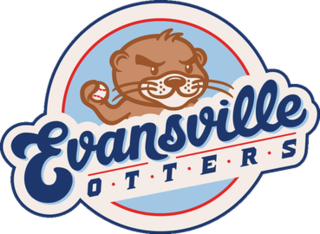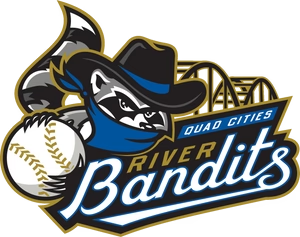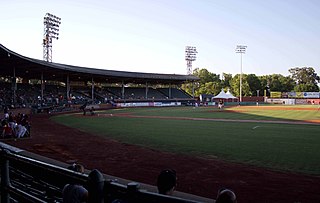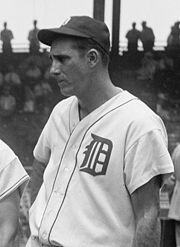
The Evansville Otters are a professional baseball team based in Evansville, Indiana. They compete in the Frontier League (FL) as a member of the Central Division in the Midwest Conference. Since their establishment in 1995, the Otters have played at historic Bosse Field, which originally opened in 1915. The Otters are the oldest current team in the Frontier League and have won two championships.

The Quad Cities River Bandits are a Minor League Baseball team of the Midwest League and the High-A affiliate of the Kansas City Royals. Their home games are played at Modern Woodmen Park in Davenport, Iowa, one of the Quad Cities.

Bosse Field is a baseball stadium located in Evansville, Indiana. Opened in 1915, it was the first municipally owned sports stadium in the United States and is the third-oldest ballpark still in regular use for professional baseball, surpassed only by Fenway Park (1912) in Boston and Wrigley Field (1914) in Chicago.
The Illinois–Indiana–Iowa League was a low-level Minor League Baseball organization that operated for the better part of 60 seasons, with teams based in Illinois, Indiana, Iowa, Kansas, Minnesota, Missouri, Nebraska and Wisconsin. The league began play in 1901 and disbanded after the 1961 season. It was popularly known as the Three–I League and sometimes as the Three–Eye League.
Evansville, Indiana is the home to two minor league professional sports teams and one amateur sports team. The city is also the home to two NCAA collegiate teams, and nine high schools that participate in the Indiana High School Athletic Association. Evansville is also the host to the annual Hoosier Nationals and Demolition City Roller Derby.

The Evansville Braves was the primary nickname of a minor league baseball team based in Evansville, Indiana 1938–1942 and 1946–1957, playing in the Illinois-Indiana-Iowa League. Baseball Hall of Fame Inductees Bob Uecker and Warren Spahn played for Evansville during this era.
The Evansville River Rats were a professional minor league baseball team based in Evansville, Indiana. They played from 1901 to 1902 in the Illinois–Indiana–Iowa League and from 1903 to 1910 and 1914 to 1915 in the Central League. They played home games at Bosse Field, which is currently the third oldest baseball stadium in regular use in the United States.
The Quincy Gems was the primary name of the minor league baseball team in Quincy, Illinois, that played in various seasons from 1883 to 1973.
Walter Guy Morrison was a professional baseball player. He played briefly in the majors for the Boston Braves in 1927 and 1928. He also served as the baseball and football coach at Montclair State University in 1929. He died of a self-inflicted gunshot wound in 1934.
The Rockford Rox was the primary moniker of the minor league baseball teams based in Rockford, Illinois, between 1871 and 1949. In an era of early baseball, Rockford hosted teams in numerous leagues beginning in 1871. From 1916 to 1923, the Rox played in the Class B level Illinois–Indiana–Iowa League, and from 1947 to 1949, they played in the Class C level Central Association. The Rockford Rox were preceded by the Rockford Red Sox (1901–1904) and Rockford Wakes (1914–1916) in the Illinois–Indiana–Iowa League. Several other Rockford teams played in various leagues leading up to the Rox. The Rockford Rox were an affiliate of the Cincinnati Reds from 1947 to 1949.
The Davenport River Rats were a minor league baseball team based in Davenport, Iowa. In 1901, the "River Rats" became charter members of the Class D level Illinois–Indiana–Iowa League, beginning a long tenure of Davenport teams in the league. The Illinois–Indiana–Iowa League became a Class B level league in 1902 and the River Rats continued league play through 1904. The Davenport "Riversides," Davenport "Knickerbockers" and Davenport "Prodigals" teams continued Davenport's membership in the Illinois–Indiana–Iowa League through 1912. The Davenport Blue Sox team continued Illinois–Indiana–Iowa League play beginning in 1913.
The Springfield Browns was a primary moniker of the minor league baseball teams based in Springfield, Illinois between 1931 and 1950. Springfield teams played as members of the Illinois–Indiana–Iowa League (1931–1932), Mississippi Valley League (1933), Central League (1934), Illinois–Indiana–Iowa League and Mississippi-Ohio Valley League (1950), winning the 1939 league championship. Hosting home games at Reservoir Park, Lanphier Park and Jim Fitzpatrick Memorial Stadium, Springfield teams were an affiliate of the 1931 St. Louis Browns, St. Louis Cardinals (1933–1934), 1935 Detroit Tigers and St. Louis Browns.
The Rock Island Islanders was the primary name of the minor league baseball teams based in Rock Island, Illinois, one of the Quad Cities, between 1892 and 1937. Rock Island teams played as members of the Illinois–Iowa League (1892), Western Association (1894), Eastern Iowa League (1895), Western Association (1898–1899), Illinois–Indiana–Iowa League (1901–1911), Central Association (1914), Illinois–Indiana–Iowa League, Mississippi Valley League (1922–1933) and Western League (1934–1937).
The Keokuk Indians was a primary nickname of the various minor league baseball teams based in Keokuk, Iowa between 1875 and 1962.

Minor league baseball teams have operated in the city of Dubuque, Iowa under a variety of names in various leagues, playing in 52 seasons between 1879 and 1976. Dubuque teams were an affiliate of the Houston Astros (1975–1976), Kansas City Royals (1968), Los Angeles Dodgers, Cleveland Indians (1961–1966), Pittsburgh Pirates (1959–1960) and Chicago White Sox (1954–1958).
The Davenport Cubs were a minor league baseball team based in Davenport, Iowa. In 1946, the "Cubs" began play as members of the Class B level Illinois–Indiana–Iowa League, continuing the tenure of Davenport teams in the league. The Cubs were a minor league affiliate of the Chicago Cubs and played through 1947. The Davenport "Pirates", Davenport "Quads," Davenport "Tigers" and Davenport "DavSox" teams completed Davenport's membership in the Illinois–Indiana–Iowa League through 1957. Davenport won the 1946 league pennant and 1949 league championship. The Davenport Braves team resumed play beginning in 1960, as Davenport joined the Midwest League.
The Alton Blues were a minor league baseball team based in Alton, Illinois. In 1917, the Blues played as members of the Class B level Illinois-Indiana-Iowa League, hosting home games at Sportsman's Park. The league folded during the 1917 season with the Blues in last place.
Minor league baseball teams were based in Hannibal, Missouri in various seasons between 1908 and 1955. Hannibal teams played as members of the Illinois–Missouri League in 1908, Central Association from 1909 to 1912, Illinois–Indiana–Iowa League from 1916 to 1917, Central Association from 1948 to 1949 and the Mississippi–Ohio Valley League from 1952 to 1955. The Mississippi-Ohio Valley League evolved to become the Midwest League.
The Terre Haute Terre-iers were a minor league baseball team based in Terre Haute, Indiana.
The Fort Wayne Railroaders were a minor league baseball team based in Fort Wayne, Indiana.





